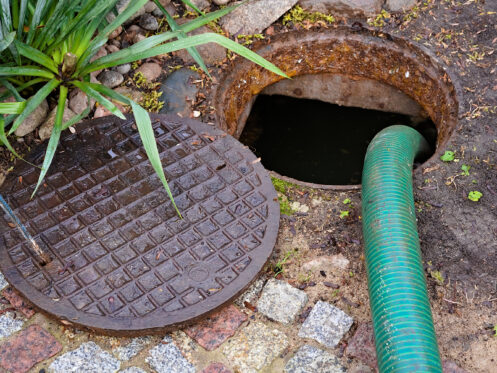When blockages develop within the sewer line that travels from your Lincoln, NE home to the municipal sewer main, you run the risk of experiencing a dangerous whole-house backup. Whole-house backups send wastewater and solid waste into all connected drains and appliances. They bring harmful pathogens and chemical contaminants into living areas and can cause significant property damage. Fortunately, there are nine easy ways to avoid them.
1. Keep Oils, Grease, and Rendered Fats Out of Your Drains
Keeping your drains clean is a critical step in protecting your sewer line. When cooking with oils, grease, or rendered fats, always dispose of them in the trash. After letting your cooking oils cool, place them in heat-resistant containers with tight, leak-proof lids. Once filled and sealed, you can place these containers in your waste bin or look for a local drop-off site for used cooking oils. Not only does proper grease disposal protect sewer lines and residential drains, but it also protects the local groundwater supply and the municipal water supply.
2. Never Send “Flushable” Wipes Down Your Toilets
Although they’re marketed as being safe to flush, “flushable” personal care wipes are terrible for plumbing systems. When enough people use them, they can wreak havoc on municipal sewer systems, too. Unlike standard toilet paper which breaks down within minutes of submersion, these wipes can maintain their integrity for weeks or months on end.
Built for resilience, they’re often reinforced with durable polymers. Moreover, once they’re in sewer lines, “flushable” wipes attract and absorb fats and adhere to one another. This results in large, hard masses known as fatbergs and smallbergs that can cause plumbing problems for everyone in your neighborhood.
If your pipes are older or if the water coming into your home is excessively hard, “flushable wipes” can also get snagged on rough pipe interiors, intrusive tree roots, or intrusive weeds. Once they do, they’ll inhibit the flow of waste and cause blocked or slow-moving drains in the building interior. It’s far safer to flush toilet paper and human waste only. As an alternative to these products, you can have your plumber install a bidet or use toilet paper spray instead.
You should also avoid flushing:
- Diapers and diaper liners
- Sanitary napkins
- Paper towels
- Sanitizing, surface-cleaning wipes
Cotton swabs, dental floss, and dental floss swords should be disposed of in trash bins as well.
3. Keep Your Drains Covered
Drain covers come in multiple sizes and designs. They’re low in cost, and they’re virtually guaranteed to pay for themselves over time. Also known as drain sieves, they catch hair and solid, non-degradable items before they enter plumbing systems. With your drains properly covered, you won’t have to worry about having bath-time toys, dropped toothbrushes, or bottle caps cause clogs and eventual backups.
4. Schedule Annual Drain Cleaning Services
Although drain covers are certainly handy, they aren’t guaranteed to catch all hair or all organic waste. Over time, the interior of your pipes will develop build-ups of soap scum, body oils, and other tough, tacky debris. These coatings gradually diminish the diameters of pipe interiors and leave wastewater and solid waste with less room to move through.
Hard water minerals also take their toll. The same build-ups of hard water deposits that develop in your shower heads and faucet aerators are also found in wastewater pipes and sewer lines. Professional drain-cleaning treatments like hydro-jetting and hydro-steaming clean pipe interiors and force build-ups to and through sewer lines. Performed at clean-outs, these treatments use hot, high-pressure water or steam to break down blockages caused by tree roots, weeds, “flushable” wipes, and accumulations of soft, semi-solid debris.
5. Follow Tree Planting Recommendations for the Region
How and where you plant your trees matters as well. Tree roots seek out weak spots in sewer lines to access the moisture and nutrient-rich contents within them. As per general recommendations, all trees should be planted at least 10 feet away from underground sewer lines. This is important to keep in mind when replacing your sewer line or revising your underground utilities to accommodate new home additions.
If you intend to plant new trees on your property, consider options with limited root growth or use root-inhibiting barriers. It’s also important to note that tree stumps can maintain living, fast-growing root systems for many years. Although you may have cut at-risk trees down to protect your sewer line, your sewer line isn’t fully protected without tree stump removal or complete stump grinding.
6. Have Your Yard Professionally Landscaped and Graded
Schedule professional landscaping services to prevent or correct recurring issues with pooling water in your yard. Frequent flooding can impact the integrity of sewer lines and significantly shorten their lifespans. Excess water can seep into tiny cracks and other points of ingress and affect the flow of wastewater. It can also lead to overgrowths of bacteria and algae that create thick, viscous slime. This biofilm may lead to blockages. As needed, consider adding additional landscape drainage and regrading your yard to better divert water away from your home’s foundation and your underground utilities.
7. Schedule Annual Whole-House Plumbing Inspections
You can catch and correct minor sewer line problems early on by scheduling annual whole-house plumbing inspections. These appointments give plumbers the chance to identify and resolve slow and hidden leaks, weak pipes, loose connections, and tree root encroachment among other things. Not only are they effective for preventing whole-house backups, but they can also significantly limit overall building damage and repair costs.
8. Protect Your Sewer Line From Freezing Temperatures
With nighttime temperatures in Lincoln often falling well below freezing during the winter months, you must have a solid plan for preventing freezing pipes. If your interior pipes freeze, your sewer line will follow suit. Worse still, although indoor pipes can sometimes defrost and resume normal functioning without rupturing, underground sewer lines won’t benefit from the heat that your furnace or boiler produces. Frozen sewer lines typically take far longer to thaw, and when they’re filled with trapped waste, they have a higher likelihood of rupturing due to expansion.
Avoid problems with freezing by doing the following:
- Insulating all outdoor and exposed pipes
- Keeping your thermostat set at 50 degrees Fahrenheit or higher
- Scheduling a pre-winter water heater inspection
- Using your hot water taps often
You can also work with our team to get needs-specific recommendations for protecting your sewer line during the winter months based on your property’s unique risk factors.
9. Avoid Do-It-Yourself Plumbing Repairs
It’s also important to avoid do-it-yourself (DIY) plumbing repairs. Using a drain snake or drain auger to break up blockages can prove problematic if the cause of a clog is a hard, non-degradable item. Mechanical tools like these can force blockages deeper into plumbing systems. Even if a trapped toothbrush, razor, or toy clears your pipes, it isn’t guaranteed to clear your sewer line. This is especially true if your sewer line is riddled with build-ups of organic waste, hard water sediment, or tree roots and weeds.
We help residents of Lincoln, NE protect their households and homes with exceptional plumbing services. We also offer top-notch heating, cooling, drain cleaning, and duct cleaning services. If you need a whole-house plumbing inspection, hydro-jetting, or sewer line repairs, get in touch with John Henry's Plumbing, Heating, Air, and Electrical today.

